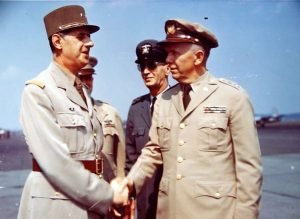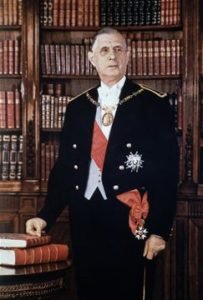The happenings in France during the WWII left the country badly bruised and one would really wonder as to what was the need for these battles especially with the neighboring country of Germany. Leaders massaging their egos and countries wanting to prove their military prowess along with greed to dominate resources were some of the excuses for choosing war as a solution it seems. France had quite a number of warriors who never shied away from doing all they could to protect their land. They did so while within the borders and when pressure became too much they sought refuge in the neighboring countries and from there continued issuing commands. One of these iconic leaders was Charles de Gaulle.
This stalwart military man had a very successful career which saw him lead various battles in WWI and WWII eventually rising to become the president of the Fifth Republic.
Early Military Career
Born in 1890, in an elite family with a strong devotion to Catholic faith he went on to follow the family precedence of attaining the best education but veered off to choose a different career from academics to a military man. This led him to enroll in one of the top military academies in France Saint-Cyr in 1909 which he completed in 1912.

A young Charles de Gaulle as a sailor.
He would upon completion join infantry regiment as a lieutenant a wing which was commanded by Colonel Philippe Petain. It’s while in WWI he could prove he was not just an average soldier by accomplishing extraordinary tasks which led him to be recognized and awarded a medal.
Apart from that he received another star and rose to the rank of a captain leading some of the most deadly battles like the Battle of Verdun in 1916. He got injured, captured and later released when the war ended. He could afterward enroll for specialized military training at the Ecole Superieure de Guerre, serve in France’s Supreme War Council and work in various countries like Germany and the Middle East.
WWII

Gen. De Gaulle(right) meeting American military officials
De Gaulle was still rising through the military ranks when Germans were closing in on France in 1940. At one point, he served as the brigadier general of the 4th Armored Division in May 1940 temporarily. As the WWII intensified, France would find itself on the receiving end forcing General Petain to negotiate a cease-fire with Germany which saw the Vichy government collaborate with the Nazis- something which de Gaulle was opposed to.
This forced him to exile to England where he became the leader of the Free French movement. From there he could continue encouraging his countrymen to continue fighting the Germans. He had the support of the British government under the leadership of Winston Churchill. He went on to organize for more soldiers from French colonies to join his home country troops and together repulse Germans. With his astuteness, he got many admirers and haters as well. The people of his home country of France liked him very much while some world leaders like President Franklin D. Roosevelt of America publicly declared he could not stand his character.
Germany would later surrender putting an end to the WWII but not before France could secure an occupation zone in Germany and a seat in the United Nations Security Council all from de Gaulle’s effort.
The Presidency

President Charles De Gaulle in his office.
The support he had from his people led him to become the president of the provisional government in 1945. He could resign after a few months due to power dispute. His patriotism saw him support the government from the back seat but when the country started experiencing problems in late 1950’s de Gaulle returned to active politics becoming the president in 1959.
He established France’s Fifth Republic, improved economic conditions and helped maintain France independence. He’s remembered for keeping France separate from the superpowers of the US and the Soviet Union. He helped Algeria achieve independence in 1962 and championed for united Europe away from the superpowers. He could continue to fight Britain out of European Economic Community for its association with the superpowers and pull his troops from NATO due to his hatred for the Americans and the so-called the superpowers.
After various achievements, he resigned as president in 1969 dying a year later on November 9, 1970, of a heart attack.
Indeed de Gaulle will be remembered as a great military leader and a statesman.
One of his famous quotes remains “A true leader always keeps an element of surprise up his sleeve, which others cannot grasp but which keeps his public excited and breathless” –Charles de Gaulle.



